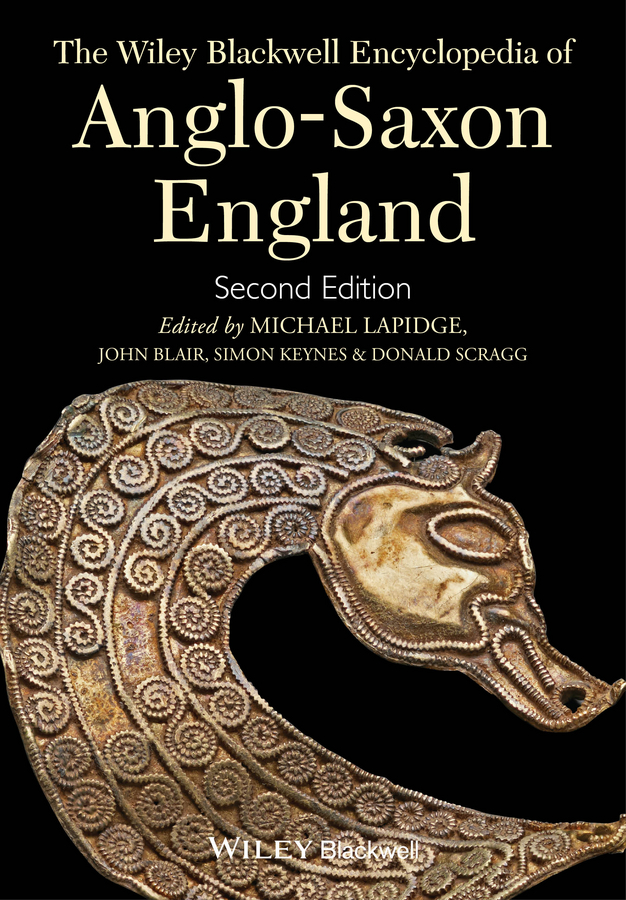Электронная книга: John Blair «The Wiley Blackwell Encyclopedia of Anglo-Saxon England»

|
Widely acknowledged as the essential reference work for this period, this volume brings together more than 700 articles written by 150 top scholars that cover the people, places, activities, and creations of the Anglo-Saxons. The only reference work to cover the history, archaeology, arts, architecture, literatures, and languages of England from the Roman withdrawal to the Norman Conquest (c.450– 1066 AD) Includes over 700 alphabetical entries written by 150 top scholars covering the people, places, activities, and creations of the Anglo-Saxons Updated and expanded with 40 brand-new entries and a new appendix detailing «English Archbishops and Bishops, c.450-1066» Accompanied by maps,line drawings, photos, a table of «English Rulers, c.450-1066,» and a headword index to facilitate searching An essential reference tool, both for specialists in the field, and for students looking for a thorough grounding in key topics of the period Издательство: "John Wiley&Sons Limited"
ISBN: 9781118316092 электронная книга Купить за 15979.58 руб и скачать на Litres |
John Blair
Infobox Judge
name = John Blair
imagesize =
caption =
office = Associate Justice of the United States Supreme Court
termstart =
termend =
nominator =
appointer =
predecessor = "(none)"
successor =
office2 =
termstart2 =
termend2 =
nominator2 =
appointer2 =
predecessor2 =
successor2 =
birthdate = Oct 1731
birthplace =
deathdate = death date|1800|8|31|mf=y
deathplace =
spouse =
John Blair, Jr. (October 1731–
John Blair was one of the best-trained jurists of his day. A famous legal scholar, he avoided the tumult of state politics, preferring to work behind the scenes. But he was devoted to the idea of a permanent union of the newly independent states and loyally supported fellow
Career before the Constitutional Convention
Blair was a member of a prominent Virginia family, served as
Blair originally joined the moderate wing of the Patriot cause. He opposed
When the Revolution began, Blair became deeply involved in the government of his state. He served as a member of the convention that drew up Virginia's constitution (1776) and held a number of important committee positions, including a seat on the Committee of 28 that framed Virginia's Declaration of Rights and plan of government. He served on the Privy Council, Governor Patrick Henry's major advisory group (1776-78). The legislature elected him to a judgeship in the general court in 1778 and soon thereafter to the post of chief justice. He was named Grand Master of Freemasons in Virginia under the newly organized Grand Lodge of Virginia in 1778. He was also elected to Virginia's high court of chancery (1780), where his colleague was
Contributions to the constitutional convention
Although a faithful attendee, Blair never addressed the Convention nor sat on any of its committees. When the question of how the President should be elected arose, he joined
Career after the constitutional convention
Blair returned to
He continued to sit on the Virginia court of appeals, where he made a number of decisions important in the formation of Virginia jurisprudence. In "Commonwealth vs. Posey", he based his decision on a 200-year-old precedent in English Common Law, thus establishing as a principle in American law that the accepted judicial understanding of a statute forms a part of the law itself and must be adhered to. More importantly, he and his colleagues on the court drafted a Remonstrance of the Judges that was successful in defending judges from the jurisdiction of the state legislature, thus preserving the principle of separation of powers in the state
upreme Court Service
President George Washington, Blair's longtime friend, chose him to be an Associate Justice of the
Blair considered the
Blair resigned from the Court due to ill health in 1796. He died in 1800.
References
*Initial article adapted from public domain U.S. military text. [http://www.army.mil/cmh-pg/books/RevWar/ss/blair.htm]
Источник: John Blair
Другие книги схожей тематики:
| Автор | Книга | Описание | Год | Цена | Тип книги |
|---|---|---|---|---|---|
| John Blair | The Wiley Blackwell Encyclopedia of Anglo-Saxon England | Widely acknowledged as the essential reference work for this period, this volume brings together more than 700 articles written by 150 top scholars that cover the people, places, activities, and… — John Wiley&Sons Limited, электронная книга Подробнее... | 15979.58 | электронная книга |
См. также в других словарях:
The Durham Proverbs — is a collection of 46 Mediæval proverbs from various sources. They were written down as a collection, in the eleventh century, on some pages (pages 43 verso to 45 verso, between a hymnal and a collection of canticles) of a manuscript that were… … Wikipedia
Culture of the United Kingdom — The Proms is an eight week summer season of daily orchestral classical music concerts, on the last night with some traditional patriotic music of the United Kingdom.[1][2] … Wikipedia
Dissolution of the Monasteries — History of Christianity in the British Isles The ruins of Glastonbury Abbey General Anglican Communion Roman Catholic Church in England and Wales Calendar of saints (Church of England) … Wikipedia
Livre de Verceil — Le Livre de Verceil ou Codex Vercellensis est l’un des quatre principaux codex[Note 1] restant de la littérature anglo saxonne en vieil anglais. Il est conservé à la bibliothèque de la cathédrale Saint Eusèbe de Verceil, sous la référence Codex… … Wikipédia en Français
Oswald (Northumbria) — Oswald (auch Oswold, Osuald, Osualdus, Osuuald; * um 604 in Northumbria; † 5. August 642 bei Oswestry) war von 634–642 König des angelsächsischen Königreiches Northumbria. Er wird als Heiliger verehrt.[1] … Deutsch Wikipedia
Oswine — (auch Osuinus; † 20. August 651) war von 642/643 bis 651 König des angelsächsischen Königreiches Deira.[1] Er wird als Heiliger verehrt.[2] St. Oswine … Deutsch Wikipedia
